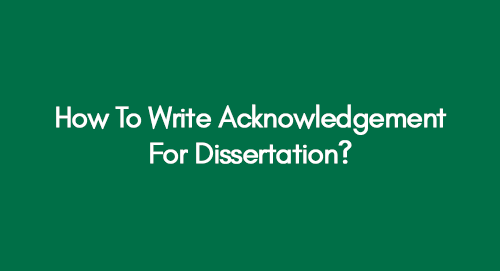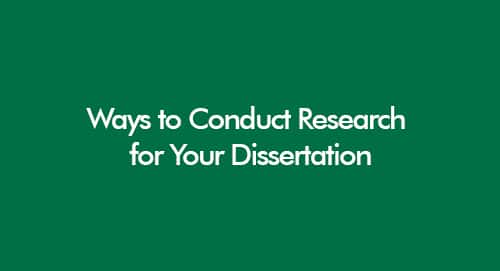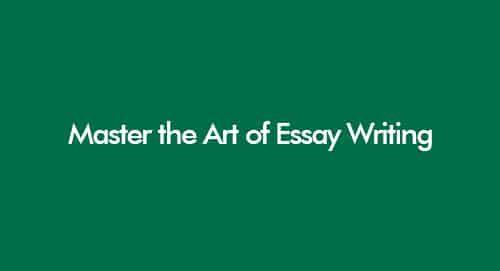
How to Write a Proposal for a Project? Expert Tips and Techniques
October 27, 2022
How to Write a Confident Conclusion for a Report: A Guide
October 27, 2022Writing an acknowledgement is the best way to express your sincerest gratitude towards those who have supported you in your thesis & dissertation. Put simply; acknowledgement is a thank-you note for all those people who have helped you in any capacity that lands you at your final dissertation destination. It can be your supervisors, committee members, family, friends, or any other source which has provided you with a meaningful way to finish your research project and writing process. The following section gives you expert tips for how to write an acknowledgement for a dissertation in a genuine and professional way.
Go to My Dissertation Topics Page
Find the Latest Dissertation Examples
What are Acknowledgements?
An acknowledgement is a section which appears before the title and the abstract page. It publicly recognizes those who have remained helpful and supportive in your research and writing. Writing can be tricky, as it requires a striking balance between a personal, heartfelt note and a formal, professional tone.
Why is Acknowledgment Important?
There are several reasons to express gratitude and establish credibility:
- First, acknowledgements are the best way to permanently express gratitude in the inscription.
- Secondly, acknowledgements can help build relationships with potential collaborators for future projects.
- Finally, recognizing the people for their potential contribution can help you ensure that your work is within ethical consideration and avoid any charge of plagiarism.
Who can be Appreciated in Your Acknowledgements?
It is rightly said, “Give the credit where the credit is due”; therefore, you must acknowledge every type of person who has remained supportive throughout your research journey. There are different categories of people who should be acknowledged according to their contributions.
Here is a list of people who you can acknowledge:
1. Academic Advisors & Committee Members
These people are the major contributors to your research. They provide you with all the guidance and feedback, without which your work can never be completed. They help you structure your work in a way that it becomes easier to navigate complex issues.
2. Peers and Colleagues
These people remain by your side throughout your research process. Sometimes, peers collaborate in your work and provide informal feedback to extend your perspectives. Their contribution can be appreciated duly.
3. Your Family and Friends
Emotional support is one of the most important supports which can keep you motivated and encouraged. This kind of support comes from family and friends. They also give non-academic feedback to expand the horizon of your research perspectives. It is really considerate to appreciate their efforts.
4. Funding Organizations
Some individuals or organizations often provide financial aid. Appreciating the financial support of various foundations or individual donors is really thoughtful.
6. The Staff of your Library
This type of contribution is often ignored. During your resource-hunting process, the library staff guides you to obtain your relevant information. Their efforts should also be rightly highlighted in your acknowledgement section.
7. Research Participants
These are the individuals who participate in your data collection process. They either work as subjects or respondents in your research procedures. Their time and efforts should be given special acknowledgement.
8. The Reviewers of Your Paper
The reviewers of your paper provide you with valuable feedback that helps you to improve your work. Remember to appreciate them for their time and efforts.
This type of acknowledgement is required for the person who has passed away, and his contribution to the work is mentioned posthumously. It is typically referred to as the people whose work has played a great role in the continuation of your work, such as famous authors and writers.
Explore Our Expert Assignment Writing Services Here
It is worth mentioning here that you are not bound to follow one type of acknowledgement for your thesis & dissertation. You can mix up two or more types for your genuine tone of acknowledgement.
Types of Acknowledgement Writing
Different types of acknowledgements are followed according to the different nature, purpose and audience.
Formal Acknowledgement
This type of acknowledgement carries a more formal and professional tone than the personal tendency. It is typically written for a thesis, dissertation, research papers for journals or business writings. It can also include appreciation for all those organizations that offer financial support.
Informal Acknowledgement
This kind of acknowledgement has a more personal tone than the formal one. It is written for non-academic writings, memoirs, novels and other creative writing adventures. It adds a more lyrical expression to your writing. It refers to muses and inspirations for your research and writing.
Posthumous Acknowledgement
This type of acknowledgement is required for the person who has passed away, and his contribution to the work is mentioned posthumously. It is typically referred to as the people whose work has played a great role in the continuation of your work, such as famous authors and writers.
It is worth mentioning here that you are not bound to follow one type of acknowledgement for your thesis & dissertation. You can mix up two or more types for your genuine tone of acknowledgement.
Explore Some Samples of Dissertation Acknowledgement Here
Expert Tips for Writing a Heartfelt and Professional Thesis Acknowledgement
The following will help you in how to write a thesis & dissertation acknowledgement:
Start with a Sincere Tone
The tone of your acknowledgement section should be sincere and genuine. Start with the person who has helped you the most during your thesis writing journey. In general, the most important name is your overseeing supervisor’s name which can be followed up by other dedicated teachers, supportive family members, and friends. You can use first person pronouns to make your tone seem sincere and personal, for instance, “I would like to thank Dr Walter for his unwavering help….”. It is also important to avoid clichés and keep your acknowledgement concise and pithy.
Follow the Right Format
The format of acknowledgement writing varies from one institution to another institution. Check the guidelines provided by your institution and consult with your supervisor before writing the acknowledgement section. Typically, it comes between the title and abstract with the heading “acknowledgements” or “acknowledgement”. Moreover, it is traditionally kept to one page, but you may check with your institutional guidelines to increase the number of pages.
Make an Exhaustive List
It has often been noted that after the publication of research work, some people regret missing out on some names in their acknowledgement section because it is written without proper thought and planning. According to experts, you should make an exhaustive list of all the people who help you in any capacity throughout your writing and research process. Arrange your list according to the most important people. Some people find it difficult to choose between more and less important contributors; therefore, writing the list of names in alphabetical order and mentioning their specific contributions is completely acceptable. Moreover, it is also customary to add the names of the committee members.
Be Specific
It is quite thoughtful and respectful if you mention the name of the people along with the specific contributions they have made in your dissertation journey. Categorize the nature of help from academic help, financial aid to emotional support. In this way, you can specify the nature of your contribution in a sincere way.
Edit and Proofread
Editing and proofreading any piece of writing should be followed like a sacred ritual. A famous writer, Michael Lee, emphasizes the importance of editing and re-visioning “The first draft reveals the art, the second draft reveals the artist”. It is important to proofread your acknowledgement section in order to make your writing look like an expert. You should also read it out loud to a friend or colleague to get more suggestions.
Conclusion
Writing an acknowledgement for your dissertation can be challenging, but it is also an excellent opportunity to show appreciation for the people who have supported you throughout your academic journey. Following the aforementioned tips can help you craft a sincere, personal, and professional acknowledgement that will impress your readers.
The above-mentioned tips and techniques have shown the right way to write your acknowledgement section. Still, you can become a more proficient writer by using more resources, guidelines and dissertation writing services available on our website.
Explore the following topics:
Contact Premier Dissertations to write a striking dissertation acknowledgement for your academic piece.
Get 3+ Free Dissertation Topics within 24 hours?



























